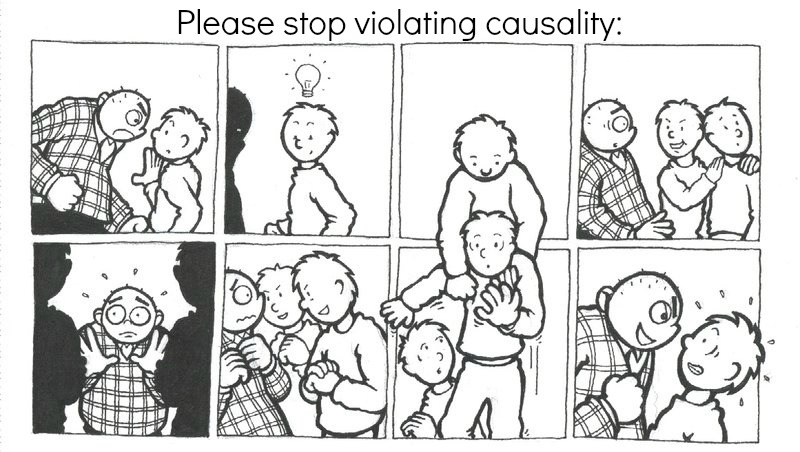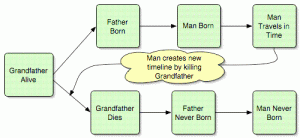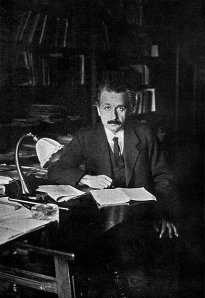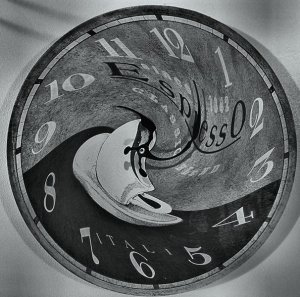
The concept of time travel has become popular ever since H.G. Wells wrote the science fiction novel: “The Time Machine”, way back in 1895. Wells coined the term “time machine” to describe a machine that can travel forwards and backwards in time. Now, such a machine is generally called as such. Ever since the publication of this novel, the concept of time travel continues to captivate the minds of many people.
Time travel has been a cause of debate for many physicists. They usually debate upon the possibility of time travel. Of course, before we try to build a real time machine, we must be sure that it is possible. Many physicists are convinced that time travel is not possible because of the many paradoxes that it causes. Prepare yourself for a mind-bending journey as we try to understand the 3 main categories of paradoxes and decide for ourselves whether time travel really is a possibility.
TEMPORAL PARADOX

The most famous time travel paradox of all, the grandfather paradox, belongs to this category. The temporal paradox deals with actions done in the past that will affect the future in a way that will stop the action to be done. This can be clearly understood from the grandfather paradox. The grandfather paradox simply states that:
What if you travel back in time and kill your grandfather? One of your parents would not have been born, so you would not have been born. If you have not been born, then your grandfather would not die, so you will be born, returning us to our original position and creating an infinite loop. So, can you travel back in time and kill your grandfather?
A pretty good solution for this is to say that the universe will not allow you to kill your grandfather. Something will surely happen that will prevent you to kill your grandfather since he lived up to the present time(the time you came from). Some physicists, on the other hand say that when you travel back in time, you arrive at a different parallel universe; allowing you to change the past without causing any paradoxes.
The temporal paradox arises when the effect of a certain action is to stop the cause from taking place. Fundamentally, this paradox deals with the cause and effects of actions done in the past.
ONTOLOGICAL/BOOTSTRAPS PARADOX

The ontological paradox deals with the origin of anything that is sent back in time. For example, what if we go back in time and teach the young Einstein special and general relativity. After that, when we go back to our time, what if we ask: “Where did the idea of special and general relativity come from?” We can not say that it is from Einstein, since we taught him those, and we also cannot say that it came from us, since we learned it from him. This will again create an infinite loop, while the idea seems to have no point of origin.
We can get a solution for this from Einstein’s general relativity. In terms of spacetime, an object, or an idea that is sent back in time to create the said paradox, can be said to be on a loop in spacetime. And, surprisingly, Einstein’s equations do not forbid these loops to form in spacetime. They even suggest that spacetime can be bent and twisted to any shape.
The ontological paradox arises because if time travel is possible, then the future, present and past will not be definite. If that is the case, then, the word origin would be meaningless. When we say origin, we are talking about the past and if the past can not be clearly defined, then we will obviously have a problem pinpointing the origin of anything.
PREDESTINATION PARADOX
The predestination paradox is somewhat like the temporal paradox; the only difference is that the effect in the predestination paradox leads back to its cause, instead of stopping the cause. An example of this is: Let’s say your father died in an accident years ago. You, then, decided to build a time machine to stop the accident from happening. After you built the time machine, you immediately went to the past to stop the accident from happening only to find out that it is your arrival in the past that caused the accident to happen. The action here is building a time machine. The cause is the accident involving the father. The effect here leads you back to the cause, which is the accident. In this paradox, it is the action that seems to exist in a loop. We can never tell which started this loop in the first place.
Again, according to Einstein, space-time loops are possible, but the real problem that arises is that because of this paradox, cause and effect can have no meaning. We may never know which is the cause, or which is the effect. If that is the case, we can conclude that history is pre-written. We don’t have free will, since we already established that cause and effect has no meaning.

Time travel still remains as a puzzle that is very difficult and enjoyable to solve, but up to now, all that we can ever do to prove or disprove it is through philosophy. The science that we have can already deal with time travel, but the technology is still far behind. Who knows if in the future, we will be able to time travel?